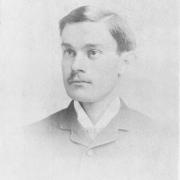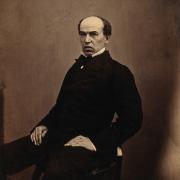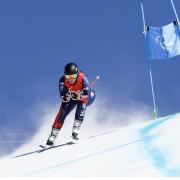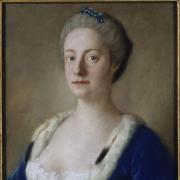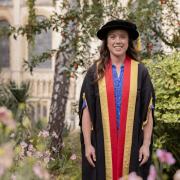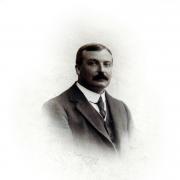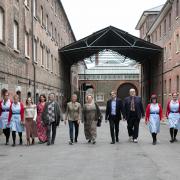Did William Golding’s years as a schoolteacher in Maidstone help inspire his classic novel, Lord of the Flies?

William Golding rocked up in Kent in 1938 as storm clouds gathered. For the second time in a generation it was the calm before the storm and Kent would be in the British frontline. Golding had other things on his mind, however; he’d arrived in the county as a schoolteacher.
Born in September 1911 in Cornwall and educated at Marlborough Grammar School and Oxford, he would become one of our most famous modern novelists, with a penchant for symbolic, moralistic tomes, analysing man’s dark corners.
Before that, however, he had an eclectic life and career, spanning acting, lecturing, sailing, music, and school teaching. Somewhere he found his true vocation.

We know Golding had some literary output before arriving in Kent. Poems came out in 1934; although he is revered as a novelist, he also wrote poetry and plays. In 1938 he arrived at Maidstone Grammar, founded in 1549, to teach Latin to the town’s well-to-do students.
The school moved to its current 16-acre site in 1929, which is where Golding demanded the rapt attention of his charges. As a literary luminary, he would appreciate the school’s library, which has some 15,000 volumes.
As well as Golding, MGS has a glittering rollcall of past talent, including: teacher Jonathan Nunn (chess grandmaster) and former pupils James Burke (TV presenter), Richard Beeching, synonymous with railway closures, author John Stroud, Michael Tillett, director of music at Rugby, an Olympic athlete, a Red Arrow pilot, a Kent cricketer and a Member of the European Parliament.

Golding’s Kentish sojourn (1938-40) came before his literary flowering, so what influence might those years in the south east have had on his later blossoming as a writer?
Golding applied for, and got, a teaching post at Maidstone in September 1938. Although we associate him with English, it appears to have been his qualifications in Music (he’d passed some piano exams) that got him the job, as the school had its first Music candidate at Higher School Certificate.
One of the extra-curricular contributions he made was establishing and directing a small choir, which even performed a Golding arrangement at a Christmas concert.

That music candidate remembered Golding for his keenness, energy and sociability and popularity among the boys (he no doubt gained some respect for being a published poet).
He was also described as ‘scruffy’ and was once spotted with a hole in his trousers. This was symptomatic of being ‘hard up’ rather than setting out to be scruffy or anti-establishment.
He was never much good at managing his finances, apparently. He could dress up when the occasion demanded, however; take the school concert in 1938 when he appeared in immaculate evening dress, complete with white silk scarf.

We know he went on to teach English and Music and that he lived in a council flat. Golding was certainly in digs at 53, Hastings Road, in the winter of 1938, as it was here he was receiving demands from his former Oxford college; he still owed them money.
In spite of his debts, Golding enjoyed himself. In the Christmas concert of 1938, he played Snow White, complete with long blond plaits and was thereafter dubbed ‘Goldilocks.’
In March 1939 Golding was co-producer of performance of Julius Caesar, where he coached the doomed Caesar how to fall backwards in the act of death, without doing himself a mischief.

It would be 1958, well after the Maidstone years, when Golding was made aware that he was too ‘well-off’ to continue in a council flat: he took this as a compliment.
If you wanted to be really respected by the boys, however, you needed to be good at sports and Golding was. In a June 1939 cricket match he took three wickets, including the school captain. Pupil and future novelist John Stroud proudly recalled bowling one into Golding’s midriff. Golding also showed prowess on the rugby field, playing in the scrum.
It wasn’t all fun for Golding and he showed a growing social conscience by teaching English at Maidstone Jail. It was also while at the school that he met Ann Brookfield, an intellectually gifted daughter of an upmarket grocer (Ibberson & Wood, in Lower Stone Street), whom he married in September 1939, four weeks after war had been declared and just five months after they met.
Golding was so broke Ann paid half the cost of her own wedding ring, but the marriage went on to last 54 years. Apparently, they met in London (although Ann lived in Maidstone) and the story goes that, if it wasn’t ‘love at first sight’, then the deal was done within 30 minutes.
Despite both being already betrothed, they were married at Maidstone Register Office in the company of a few friends, then headed to the pub.
If you’d caught up with Golding during his time off in Kent, you might have found him engaged in a relaxing activity: dabbling with music, playing chess and pottering at archaeology.
Sailing mostly came later, as did reciting a bit of classical Greek (he taught himself).
Golding left Kent to join the Royal Navy and was on one of the ships pursuing Bismarck in the North Atlantic, finishing the war as a lieutenant in command of a rocket ship. He was engaged on D-Day, when his ship fired salvoes in support of the invasion.
Apparently the Oxford college bursar was still pursuing Golding during the Second World War when, no doubt, the lapsed teacher had other things on his mind. He tried writing to Maidstone Grammar in February 1941, only to be told his quarry was on active service. The debt was finally repaid in 1957, by which time Golding owed quite a bit in interest too.
After the war Golding returned to teaching, but not in Kent. He had been fired from his Maidstone job, although why remains something of a mystery. Golding put it down to a combo of, ‘drink, women and politics’ (he was a heavy drinker, a womaniser and notoriously left-wing). His future teaching career would be in Salisbury.
Of course, the work that Golding is most remembered for, Lord of the Flies (1954), has schoolchildren at its core. The basic premise that youngsters, stranded on a tropical island by a plane crash, revert to extreme savagery is conceivable, when all protections and rules have been stripped away. Kingsley Amis called it “terrifying and haunting.”
Golding’s seminal work was made into a successful film (1963), which is as harrowing as the book is uncomfortable.
Is it stretching a point to suggest he first got the idea when embarking on his teaching career in Maidstone? It is entirely possible that his experience of children in Kent added to his knowledge, while his participation in war also helped precipitate the idea for the book.
Golding finally gave up teaching in 1961, but still had time to accumulate a total of 13 novels by the time he’d finished. He won both the Booker Prize (1980) and the Nobel Prize for Literature (1983). Golding was also knighted in 1988. He passed away in June 1993, aged 81.
Acknowledgements
Judy Carver, daughter of William Golding
Chambers Biographical Dictionary, 1974
Lord of the Flies, William Golding, 1954
William Golding: The Man who Wrote Lord of the Flies, J Carey, 2010
Maidstone Grammar School, www.mgs.kent.sch.uk
Daily Mail, www.dailymail.co.uk
The Guardian, www.theguardian.com




